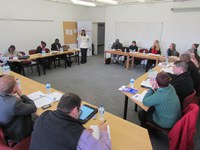Roundtable on meaningful engagement as a political process: Understanding the roles of government, citizens and civil society
The Socio-Economic Rights Project at the Community Law Centre (CLC) of the University of the Western Cape, and the Socio-Economic Rights and Administrative Justice Research Group (SERAJ) of the Faculty of Law, University of Stellenbosch hosted a roundtable with the theme “Meaningful Engagement as a Political Process : Understanding the Roles of Government, Citizens and Civil Society” on 30 May 2013.
Around 35 participants from government, community organisations, social movements, and academia took part to share their experiences and practices around meaningful engagement. The roundtable discussion was an informal dialogue guided by a set for questions designed to enable participants actively engaged with each other and keep the conversation flowing.
The discussion focused on ways citizens and citizen groups, civil society, government and the courts can implement the constitutional requirement that the state meaningfully engage people affected by social welfare policies and organisations representing their interests. During the roundtable discussion, it was acknowledged that court decisions involving meaningful engagement have focused largely on the context of pending or imminent litigation. Although this is an important component of meaningful engagement, limiting engagement to this kind of informal dispute resolution misses much of its potential. Thus, discussants are of the view that meaningful engagement should be viewed from a broader perspective.
Engagement reinforces and overlaps with administrative law, public-education and consultation processes and good-governance principles more generally. The roundtable examined the nature those relationships, how existing policies and programs contribute to meaningful engagement and ways they could be adapted and extended to create state capacity to meaningfully engage. Participants were encouraged to highlight challenges and make proposals or suggestions as to how to address issues identified.
Some of the participants from informal settlements such as Marikana and Blikkiesdorp shared their experiences and frustrations they encounter in engaging with government officials at provincial and municipal levels on housing issues. It was generally acknowledged that in order for service delivery to be effective and have positive impact on people’s quality of life, real “meaningful engagement” must be sustained and should not be a once-off encounter between communities and government officials.
According to Prof Brian Ray, "We had an animated and open discussion that highlighted a range of problems from service-delivery failures to lack of access to basic information. It's clear that meaningful engagement cannot address many of the more difficult issues, but it can provide a tool for improving communication, transparency and accountability. The challenge going forward is to develop concrete proposals for applying meaningful engagement in specific policy contexts."
According to Gladys Mirungi-Mukundi of Socioeconomic Rights Project, Community Law Centre’ The event is unique in the sense that it brings together vulnerable and marginalised groups from informal settlements, civil society groups, policy makers and academia to discuss common and important issues affecting the socioeconomic lives of the people. It can be said that this is a good example of how to meaningfully engage’.
Among the discussants in the roundtable were Prof Brian Ray, a Fulbright Scholar and Professor of Law at Cleveland-Marshall College of Law in Cleveland, Ohio (USA), Prof Sandy Liebenberg, the H.F. Oppenheimer Chair in Human Rights Law, based at Stellenbosch University’s Faculty of Law and Dr Ebenezer Durojaye, head of the Socio-Economic Rights Project at the Community Law Centre (CLC) of the University of the Western Cape.
This event followed up on a roundtable that addressed meaningful engagement more broadly hosted by the Socio-Economic Rights Project of the Community Law Centre and the Socio-Economic Rights Institute of South Africa in March 2010. Funding for this event was generously provided by the Ford Foundation.

